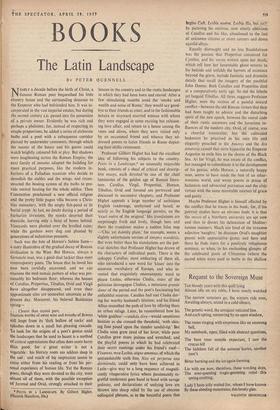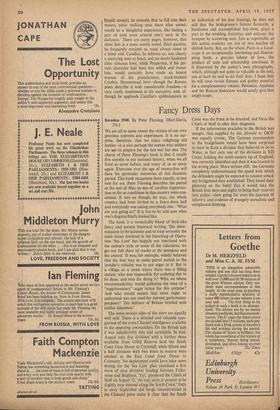BOOKS
The Latin Landscape
BY PETER QUENNELL NEARLY a decade before the birth of Christ, a famous Roman poet bequeathed his little country house and the surrounding demesne to the Emperor who had befriended him. It was in- corporated in the vast imperial estates, but during the second century A.D. passed into the possession of a private owner. Evidently he was rich and perhaps a philistine; for, instead of respecting its simple proportions, he added a series of elaborate baths and a pool with a subaqueous corridor pierced by underwater casements, through which the master of the house and his guests could watch brightly coloured fish at play. But shadows were lengthening across the Roman Empire; the next family of inmates adapted the building for more practical purposes, like the modern in- heritors of a Palladian mansion who decide to demolish the stables and the wings, and recon- structed the heating system of the baths to pro- vide central heating for the whole edifice. Then Constantine proclaimed a new official religion and the pretty little pagan villa became a Chris- tian monastery, with the empty fish-pond as its burial crypt. At last, no doubt during a period of . barbarian invasions, the monks deserted their domicile, leaving only a heap of bones behind. Vineyards were planted over the levelled ruins; while the gardens were dug and planted by generations of industrious peasants.
Such was the fate of Horace's Sabine farm— a story illustrative of the gradual decay of •Roman civilisation in the West. But Horace, always a fortunate man, was a good deal luckier than most contemporary poets. The house that he, loved has now been carefully excavated, and we can examine the neat mosaic pattern of what was pre- sumably his bedroom floor; whereas the houses of Catullus, Propertius, Tibullus, Ovid and Virgil • have altogether disappeared, and even their approximate sites are somewhat uncertain at the present day. Moreover, his beloved Batidusian spring- . . Clearer than crystal pure, fountain worthy of sweet wine and wreaths of flowers still leaps from its 'dark hollow of rocks' and splashes down in a small but pleasing cascade. To look for the origins of a poet's genius amid the landscapes that he used to haunt is a method of critical appreciation that often does more harm than good; for a great writer is not a vegetable : his literary roots are seldom deep in the soil : and much of his inspiration seems to come either from his reading or froni his per- sonal experience of human life. Yet the Roman Poets, though they were devoted to the city, were almost all of them, with the possible exception of Juvenal and Ovid, strongly attached to their * POSTS IN A LANDSCAPE. By Gilbert Highet. (Hamish Hamilton, 30s.) houses in the country and to the rustic landscapes in which they had been born and reared. After a few stimulating months amid the 'smoke and wealth and noise of Rome,' they would say good- bye to their friends at court, and to the fashionable hetaira or wayward married woman with whom they were engaged in some exciting but exhaust- ing love affair, and return to a house among the vines and olives, where they were visited only by an occasional friend and whence they ad- dressed poems to lazier friends in Rome depict- ing their idyllic retirement.
Professor Gilbert Highet has had the excellent idea of following his subjects to the country. Poets in a Landscape,* an unusually enjoyable book, consists of a sheaf of critical and descrip- tive essays, each devoted "to one of the chief luminaries of the golden age of Roman litera- ture. Catullus, Virgil, Propertius, Horace, Tibullus, Ovid and Juvenal are portrayed and discussed in successive chapters; and Professor Highet appends a large number of ambitious English renderings, unrhymed and based, as nearly as the English language permits, on the 'exact metre of the original.' His translations are surprisingly fresh and lively, though here and there the translator makes a sudden false step =Chic yet daintily plain,' for example, seems a slightly unfortunate version of simplex munditiis. But even better than his translations are the por- trait sketches that Professor Highet has drawn of the characters of individual poets. There is the unhappy Catullus, most endearing of them all, who introduced a new word for 'kisses' into the amorous vocabulary of Europe, and who in- vented that exquisitely onomatopceic word to please Lesbia, otherwise Clodia, sister of the patrician demagogue Clodius, a notorious grande dame of the period and the poet's fascinating but unfaithful mistress. Catullus had met Clodia dur- ing her worthy husband's lifetime; and his friend Allius smoothed the path of love by offering them an urban refuge. Later, he remembered how his 'white goddess'—candida diva—would sometimes hesitate as she crossed 'the threshold, 'with shin- ing foot posed upon the slender sandal-tip.' But Clodia soon grew tired of her lover, while poor Catullus grew more jealous and wretched; and the playful poems in which he had celebrated their secret meetings under his friend's roof- Vivamus, rnea Lesbia,'atque atnemus, of which the untranslatable sixth line, Nox est perpetua una dormienda, could only have been achieved in Latin—give way to a long sequence of magnifi- cently vituperative lyrics where passionately re- gretful tenderness goes hand in hand with savage jealousy, and declarations of undying love are thrown into sharp relief by the use of obscene colloquial phrases, as in the beautiful poem that begins aril, Lesbia nostra, Lesbia illa, but end:- by picturing his mistress, now utterly oblivious of Catullus and his like, abandoned to the lust of unknown citizens at street corners and down squalid alleys.
Equally distraught and no less Baudelairean was the passion that Propertius conceived for Cynthia; and his verses written upon her death, which tell how her lamentable ghost returns to his bedside and unfolds the horrors of existence beyond the grave, include fantastic and dramatic details that recall the imagery of the youthful John Donne. Both Catullus and Propertius died at a comparatively early age. So did the febrile yet languid Tibullus. All three, suggests Professor Highet, were the victims of a painful inward conflict—between the old Roman virtues that they had been taught to admire and the disturbing spirit of the new epoch, between the moral code of their rustic ancestors and the luxurious in- fluences of the modern city. Ovid, of course, was a cheerful immoralist; but the cultivated hedonism he practised in his own life and elegantly preached in the Amores and the Ars amatoria caused that stern hypocrite the Emperor Augustus to exile him to the shores of the Black Sea. As for Virgil, he was aware of the conflict, but managed to subordinate it to the development of his genius; while Horace, a naturally happy man, seems to have made the best of an inhar- monious world, and wrote poems in praise of hedonism and advocated patriotism and the civic virtues with the same inimitable mixture of grace and gaiety. . . .
Maybe Professor Highet is himself affected by the conflict that he traces in his book; for, if his portrait studies have an obvious fault, it is that the mores of a Northern university are apt now and then to distort his delineation of Mediter- ranean manners. Much too fond of the tiresome adjective 'naughty,' he discusses Ovid's naughtier poems with appreciative gusto; and here and there he finds room for a positively voluptuous sentence, as when, in his enchanting glimpse of the celebrated pools of Clitumnus (where the sacred white oxen used to bathe in the shallow limpid stream), he remarks that to fall into their waters, while walking near. them after sunset, would be a 'delightful experience, like feeling a pair of cool arms around one's neck in the darkness.' There are many pages, however, that show him in a more ascetic mood. Illicit passion, he frequently reminds us, must always come to a bitter end. Catullus, he informs us, was clearly a marrying man at heart, and no doubt hankered after virtuous love; while Propertius, if his pri- vate character had been less selfish and irreso- lute, would certainly have made an honest woman of his promiscuous, crack-brained Cynthia. Homosexual love—though the Roman poets describe it with considerable freedom—is very rarely mentioned in his narrative; and, al- though he applauds Catullus's epithalamium as
an indication of his true leanings, he does not add that the bridegroom's former favourite, a handsome and accomplished boy-slave, plays a part in the wedding festivities and enlivens the banquet by scattering nuts. Just as regrettable as this undue modesty are one or two touches of skittish levity. But, on the whole, Poets in a Land- scape is an exceptionally interesting and illumin- ating book, a genuine labour of love, the product of taste and scholarship combined. It is illustrated by the author's own photographs, which, although not quite so valuable as his text, can at least be said to do their duty. I hope that he will soon revisit Europe and gather material for a complementary volume. Petronius, Apuleius and the Roman historians would surely give him ample scope,



































 Previous page
Previous page